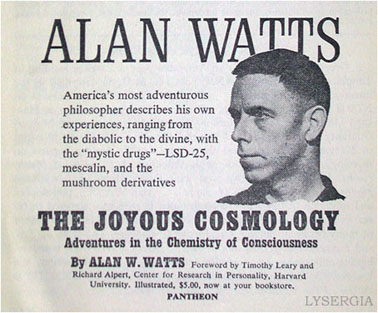Now Playing: Justice label mix-CDR
Review by Patrick Lundborg
It is a pleasure to observe the continuing interest in Psychedelia around the world, the latest sign of which is a new edition of one of the early classics, Alan Watts' The Joyous Cosmology. Originally published in 1962 this has been out of print for decades, while the interest in Watts shows no signs of declining; on the contrary. During the 2000s, Watts has become probably the second most sampled voice heard on psychedelic ambient and downbeat electronica tracks (after the omnipresent Terence McKenna). Watts' thoughts, and the Joyous Cosmology in particular, was also a primary source text for my recent book Psychedelia, as will be shown below. Prior to that, a bit of background on the great man.
With a mind both open and agile, Alan Watts (1915-1973) examined a wide range of esoteric traditions. The fruits of his studies he passed on to curious Westerners in a variety of formats, beginning with radio shows in California, but also through books, lectures and recordings. The latter produced the now-legendary 1962 LP This Is IT which today is considered a vital prototype for the eruption of psychedelic pop culture in the mid-'60s. At the time Watts' interest in psychedelic drugs was at its peak, and he diligently experimented with the major hallucinogens and observed his reactions. This period of mind expansion was documented in The Joyous Cosmology, a slender volume which stands as Watts' most important work today, and a given inclusion in a library of psychedelic source texts.

The Joyous Cosmology resembles Huxley's The Doors Of Perception to some degree, and the classic work of Watts' fellow British ex-patriate may have served as inspiration for his ruminations. While comparisons aren't entirely meaningful, one might observe that Watts' conclusions are just as useful as Aldous Huxley's, perhaps even more useful from the perspective of a modern reader. Watts contemplated the psychedelic state for a longer and more variable time than his colleague, allowing him to formulate viewpoints that are less anecdotal and less private.
At the same time, Watts' intelligent and slightly trickerish personality is much in evidence throughout the book, and his substantial training in the spiritual traditions of the East clearly allowed him to accept the often ambiguous and contradictory flow of psychedelic cognition. If at certain turns the LSD experience seems to reveal itself as meaningless, then so be it; so, too, does the Buddhist path at some points in that journey. Watts' conclusions on the psychedelic state and the workings of the mind are valuable, but he is equally able to drill down into the here and now of a trip through Innerspace. His detailed recollection of listening to classical music on LSD is one of the very best replications of the strange state of confusion and euphoria, and melancholy and brilliance, and numerous other moods that one experiences during the trip. It works as an excellent chapter for non-acidheads to find out what it's like to be on LSD, and it also proves that psychedelic trips can be described in words, despite some people's claims.
The Joyouos Cosmology was a significant source text for me when developing the psychedelic philosophy described in my book Psychedelia--An Ancient Culture, A Modern Way Of Life (2012). Watts' readiness to discuss the hallucinogen trip as a spiritual experience in itself, rather than as a metaphor or gateway into something else, offers a useful model in general terms, but there was also a direct, specific influence. What Watts ultimately found in his LSD and psilocybin trips was the notion that life could be approached as purposeless play. As I point out in Psychedelia this phrase comes from John Cage, but Watts appropriated it for his own purposes. What he seems to mean is that the quest into the essence of psychedelic ideation does not produce a distinct answer about existence in the traditional Western scientific sense; it is more like a cat chasing its own tail. Yet there is great joy and stimulation in the psychedelic activities, and Watts finds in this a satisfactory result of the series of trips he took. It could be described as a Taoist-like position, and falls well in line with Watts' overall spiritual orientation.
The phrase 'purposeless play' also works as a bridge across traditions otherwise far apart. As discussed in Psychedelia, the way Watts phrases his conclusion is reminiscent of ideas presented by the German phenomenologist Eugen Fink, who in the notion of 'play' found an acceptable representation of a metaphysical conundrum otherwise out of reach for the human reasoning mind. When engaged in 'play' we are able to come closer to the actual nature of the world than through any other activity, according to Fink.
Further aspects on the matter are discussed in my book, to which I refer for a complete explication of this psychedelic philosophy (or psychedelic phenomenology). Suffice it to say that Watts' book provided me with one of the key pieces when putting together the large psychedelic puzzle presented in Psychedelia. Most appropriately, I was engaged in a discussion about Alan Watts and this very book just the other day, when being interviewed for an upcoming podcast about psychedelic culture.
Alan Watts and The Joyous Cosmology have always been held in high regard among psychedelicists, yet one might argue that its full potential as a canonical work hasn't yet been properly realized. To this end, this new edition from New World Library appears perfectly on cue, beautifully designed and given an updated context in a new introduction by noted psychedelic researcher Daniel Pinchbeck. The original foreword by Tim Leary & Dick Alpert, written when the two were unknown researchers at Harvard Psych, is retained and shows the reader how much, and how little, psychedelic culture has changed in 50 years.

